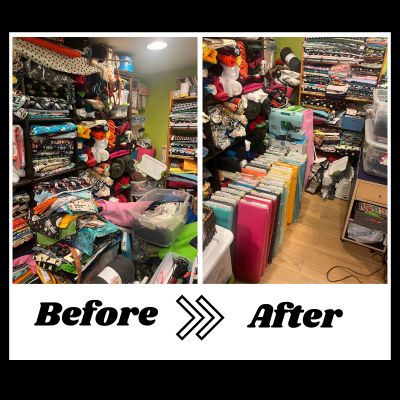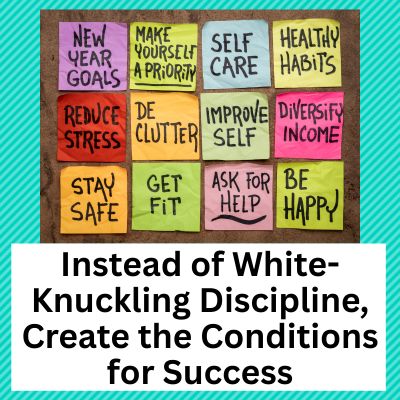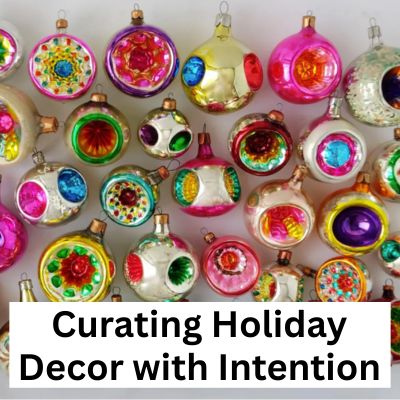Organizing for ADHD Part 1
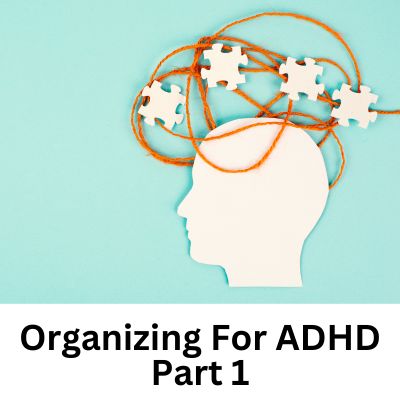
Many people are surprised to hear that I have ADHD and am a home organizer. I am organized, prepared, and have lots of good systems in place so that I can get things done. Some of these things have come naturally for me, and some of them are learned. As a kid, I didn’t show the most common signs of ADHD like hyperactivity, excessive talking, and disrupting the classroom, so I wasn’t diagnosed with ADHD until I was in high school. I had a lot of trouble focusing in class and on homework, with time management, and with verbal communication, along with other difficulties. ADHD can show up so many different ways for people, and it’s not always obvious when someone has it. In this post, I’ll talk about some of my favorite things I’ve learned along the way to help manage my ADHD.
Food/Medication/Supplements
-ADHD medication can be life changing for people, and can even save lives! There is such a huge stigma about taking ADHD medication, due to judgments about how people need to just “be more disciplined”, “try harder”, or even “stop eating so much junk food”. ADHD medication can be abused, and because of this, it can be very difficult to obtain for the people who legitimately need it to function. I love the glasses analogy. The proper medication and dosage for someone who needs it is just like wearing glasses for someone who’s vision is impaired. Medication has helped me tremendously and I’ve seen it help others enormously as well.
-Supplements can help too. Some people may still need to be on medication, and others might do just fine without it. One of the first doctors I ever saw about my ADHD prescribed me Adderall (which was life changing), but he also gave me a list of vitamins to take to help my brain get the nutrients it needed. The list included vitamin D, fish oil, B complex, and B 12. I loved that he talked about other ways to support my brain health in addition to prescription pills. In addition to these important vitamins, I have also found adrenal supplements and the amino acid L-Theanine to be very helpful.
-Food choices make a big difference, but sometimes this can be out of reach. Food that’s incompatible with you can cause inflammation, blood sugar spikes, brain fog, and will effect your mental health. Lots of people with ADHD also have increased sensitivity to foods (amongst other things). ADHD effects emotional regulation, and so making a healthy choice rather than eating a quick sugary pick-me-up can be too much of a hurdle for folks with unregulated ADHD. Medication can help make healthy dietary choices easier. Eating healthy takes time to plan and prepare, which are other skills that someone with unregulated ADHD can have a lot of trouble with. Do I eat healthy 100% of the time? No. But, when I do, it makes it easier to continue to make healthy choices, because the bacteria in my gut isn’t screaming for more sugary snacks. When I eat healthy, my quality of life improves dramatically. When you’re working on your diet, make sure to have compassion for yourself. Eating disorders, body image issues, social pressures, perfectionism, and emotional regulation all play a part in your relationship with food. Go at the speed that’s right for you. If needed, work with a functional medicine doctor, naturopath, nutritionist, or other qualified professional, to help you make changes with your diet.
Mental Input
-Hypnotherapy works! ADHD can erode self-esteem. Hypnotherapy is an incredibly effective way to help improve your self-esteem (and improve other areas in your life). Sending positive messages to your sub-conscious will help you be more receptive to opportunities and choices that will help you be the greatest version of yourself that you can be.
-Rewire neural pathways. When you catch yourself with negative self-talk, interrupt the mental pattern. Even just noticing yourself in the act of negative self-talk is half the battle. When you notice yourself going down a negative spiral, ask yourself a positive question like “What if everything works out just fine?”. Reprogramming your internal dialog will help you with other habits you’re wanting to develop as well (like processing the mail on a daily basis).
-Manage emotions. EFT tapping is a helpful way to process emotions and help manage the overwhelm and stress that can be pervasive with ADHD. This will help you be able to think more clearly instead of being reactional to the challenges that come your way. As you calm down your “fight or flight” automatic response, you are strengthening the executive functioning part of your brain that helps you with tasks like focusing, planning, prioritizing, and staying motivated.
-Find a variety of exercises that you like to do. Not only does exercise help you increase your stamina, keep excess pounds at bay, ward off illness, strengthen your heart, boost your mood, and help you live longer, it’s a great way to manage ADHD! When you exercise, you release dopamine to your brain which will help improve cognitive functioning (including focusing, memory, and organization), ease stress and anxiety, and improve impulse control. Just make sure not to push your body to the point of injury.
-Sleep! I am so excited about life that I have a hard time wanting to sleep. Over the years, I have learned just how important sleep is. I use my Oura ring to help me track my sleep and motivate me to tweak my brain so that I want to go to bed earlier. Your intuition will work much better the more sleep you get, along with many other health benefits!
In part 2 of this post, I will talk about time management and how organizing for ADHD is different than conventional organizing.
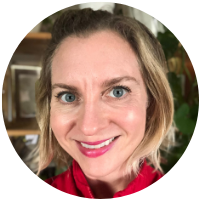
Posted By Jean Prominski, Certified Professional Organizer
-
- Follow me on Instagram @seattlesparkle
- Join my Facebook Group, Declutter and Organize with Seattle Sparkle.
- Ready to book a consultation? Complete this form.
- Download my free 5 week journal The Seattle Sparkle Method to Get Organized and Stay Organized
- Check out my media exposure: Seattle Sparkle in the Media
- For artwork to energize your home, order through jeanprominski.com.


